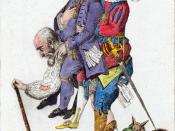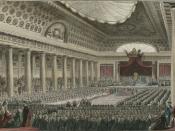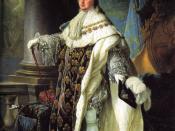I have chosen to discuss the Estates General as I feel it features centrally in the debates surrounding the French Revolution.
I intend to give a brief but accurate summary of the theme, The Estates General, followed by an attempt to explain just how relevant The Estates General is to this infamous and continually ongoing debate. Finally I will demonstrate some of the contrasting and/or comparative analysis offered by various renowned historians.
King Louis XVI of France was heir to a country deep in debt and close to becoming bankrupt. It had been common practise for the King to sell off venal offices to the bourgeoisie in order to raise revenue and to ease the burden of poverty that was befalling the country. He was desperate to gain the support of 'the people' many of whom were starving and couldn't afford the price of a loaf of bread.
Louis reinstated Jacques Necker who had earlier been seen as a financial wizard.
The hope was that Necker would construct a national budget that depended on cutting state expenditures. However, Necker failed and was forced to resign and Charles Alexandre de Calonne advised shifting the tax burden from the peasantry to the aristocracy. This displeased the nobility and in desperation King Louis summoned the Estates General in the hope that they would back his reforms.
The Estates General was made up from many hand picked deputies, whom the King thought would vote in favour of his reforms. There were three Estates, the First Estate being made up from the clergy (those that prayed), the Second Estate being made up from the nobility (those that fought) and the Third Estate (those that worked) was made up from the bourgeoisie and the peasants. There was great conflict between the various classes that held the...



Quite good
this piece is quite good but not outstanding, it is however well written and set out and is a solid piece of work.
1 out of 2 people found this comment useful.